“Switzerland should not fear backlash over ban”
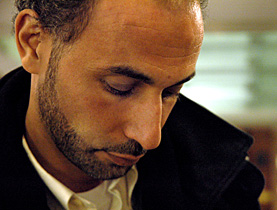
Switzerland should not be worried about a violent backlash by the Arab-Muslim world over the vote to ban minarets, says Swiss Islamic scholar Tariq Ramadan.
In an interview with swissinfo.ch, the Oxford University professor said Muslims should also see the decision by 57.5 per cent of Swiss voters to ban minarets as a wake-up call. Muslims should change their attitude and language and become “more responsible”.
swissinfo.ch: What’s your view on the Swiss vote to ban minarets?
Tariq Ramadan: The reaction of the Swiss is very interesting.
Many analysts focus just on the symbolic nature of the minaret ban but do not address the core concern. It’s obvious that the real issue in this referendum is Islam and the presence of Muslim immigrants in Switzerland.
The big problem is the new visibility of Muslims; this increasingly visible presence is what Europeans in general do not accept.
swissinfo.ch: What is the main reason for this rejection by Swiss voters?
T.R.: The main factor for the apprehension and rejection is economic globalisation and the fear it imposes on people. I believe this is key to understanding the current European identity crisis.
swissinfo.ch: Many European countries seem to have problems with Muslim immigration…
T.R.: The rejection of Islam and Arab-Muslim immigration has different aspects to it in Europe, depending on a country’s particular interests.
The French talk about the wearing of the veil in schools, the Dutch focus on intolerance towards homosexuals and for the Swiss it’s the minarets. Spain is also involved as the People’s Party treats Muslims as foreigners and unacceptable. And let’s not forget that Pope Benedict XVI constantly recalls Europe’s Latin and Greek roots, while forgetting the important role of Islam.
swissinfo.ch: Are you surprised by the size of the Swiss vote, especially as the government and most political parties clearly called for the initiative to be rejected?
T.R.: I wasn’t that surprised. The message by politicians is not neutral or favourable to Muslims. The problem is that the major democratic political parties trail behind right-wing populist movements, which really dictate the political agenda. The other parties react where possible, while faced with this fait accompli.
swissinfo.ch: Are you also referring to parties on the left of the political spectrum?
T.R.: When talking about Islam the more progressive parties always include the word “but”. They therefore make people think Islam is, by definition, a source of conflict.
Politicians almost always say “…but we are against female circumcision” or “…but we are against separate swimming pools” or “…but we are against forced marriages”. And the same goes for other issues.

More
People’s initiative
swissinfo.ch: What’s your view on the claim by various observers that Swiss feminists and left-of-centre voters gave unexpected support to the minaret initiative?
T.R.: It’s true. Even people who consider themselves progressive today vote against Muslims, and I find that very disturbing.
I think the real danger is not the right, but the way right-wing ideas have been adopted by the traditional political parties.
In France something significant has happened: it has been shown that the [right-wing] National Front (FN)’s theories can be accepted by up to 73 per cent of voters, provided they don’t know the same ideas come from the FN.
In other words, the same idea in the mouth of FN parliamentarian Marie Le Pen is approved by only 20 per cent of voters, but when uttered by other politicians it can reach up to 73 per cent.
swissinfo.ch: What should Muslims be doing now after this vote?
T.R.: I think it’s essential that there is a change of attitude among Muslims – a change in their discourse and far-reaching self-analysis.
I think what’s happening in Switzerland is a wake-up call for us, which forces us to become more responsible and active.
swissinfo.ch: Should Switzerland be preparing itself for a similar crisis to the Mohammed cartoons affair in 2005-2006?
T.R.: I don’t think Switzerland should fear a backlash by the Arab-Muslim world. The Mohammed cartoons affair was very different because it attacked the very foundations of the religion. This is not the case with the minarets, which are not essential to practising religion or prayer.
Rodrigo Carrizo Couto, swissinfo.ch (Adapted from Spanish by Simon Bradley)
Tariq Ramadan was born in Geneva on August 26, 1962. He has an MA in philosophy and French literature and a PhD in Arabic and Islamic studies from Geneva University.
He is currently working as Professor of Contemporary Islamic Studies at St Anthony’s College, Oxford University. He is also teaching at the Faculty of Theology at Oxford and is a senior research fellow at Doshisha University in Kyoto, Japan. He is president of the Brussels-based think tank, European Muslim Network.
Ramadan is the grandson of Hassan-al Banna, who founded the prominent Islamic movement, the Muslim Brotherhood, in 1928.
In 2006 he was barred by the US authorities from taking up a post at Notre Dame University in Indiana. Officials cited security concerns but the Geneva-born scholar claims it was for “ideological reasons”.
Ramadan, who lives in London, says he is trying “to build bridges between two worlds that don’t know each other very well”.
Switzerland is the first European country that has forbidden the construction of minarets.
On November 29, 57.5% of voters were in favour of a people’s initiative that said quite simply: Against the construction of minarets.
Several plans for building minarets in the German-speaking part of Switzerland were the catalyst for the initiative. Local residents collected signatures against the planned towers.
They were supported by the rightwing Swiss People’s Party and the Federal Democratic Union, which coordinated efforts.
The Muslim community accounts for about 4.5% of the Swiss population.
There are about 200 mosques and prayer rooms in Switzerland, but only four have a minaret.

In compliance with the JTI standards
More: SWI swissinfo.ch certified by the Journalism Trust Initiative

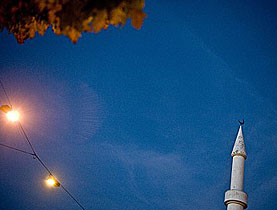
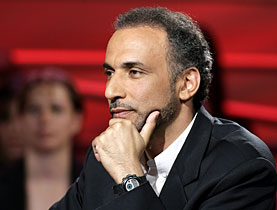
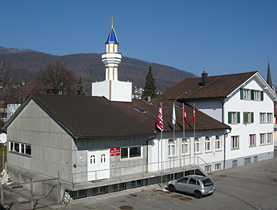
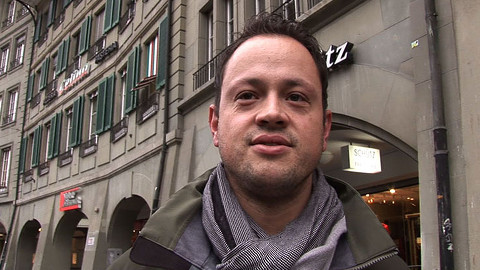
You can find an overview of ongoing debates with our journalists here. Please join us!
If you want to start a conversation about a topic raised in this article or want to report factual errors, email us at english@swissinfo.ch.